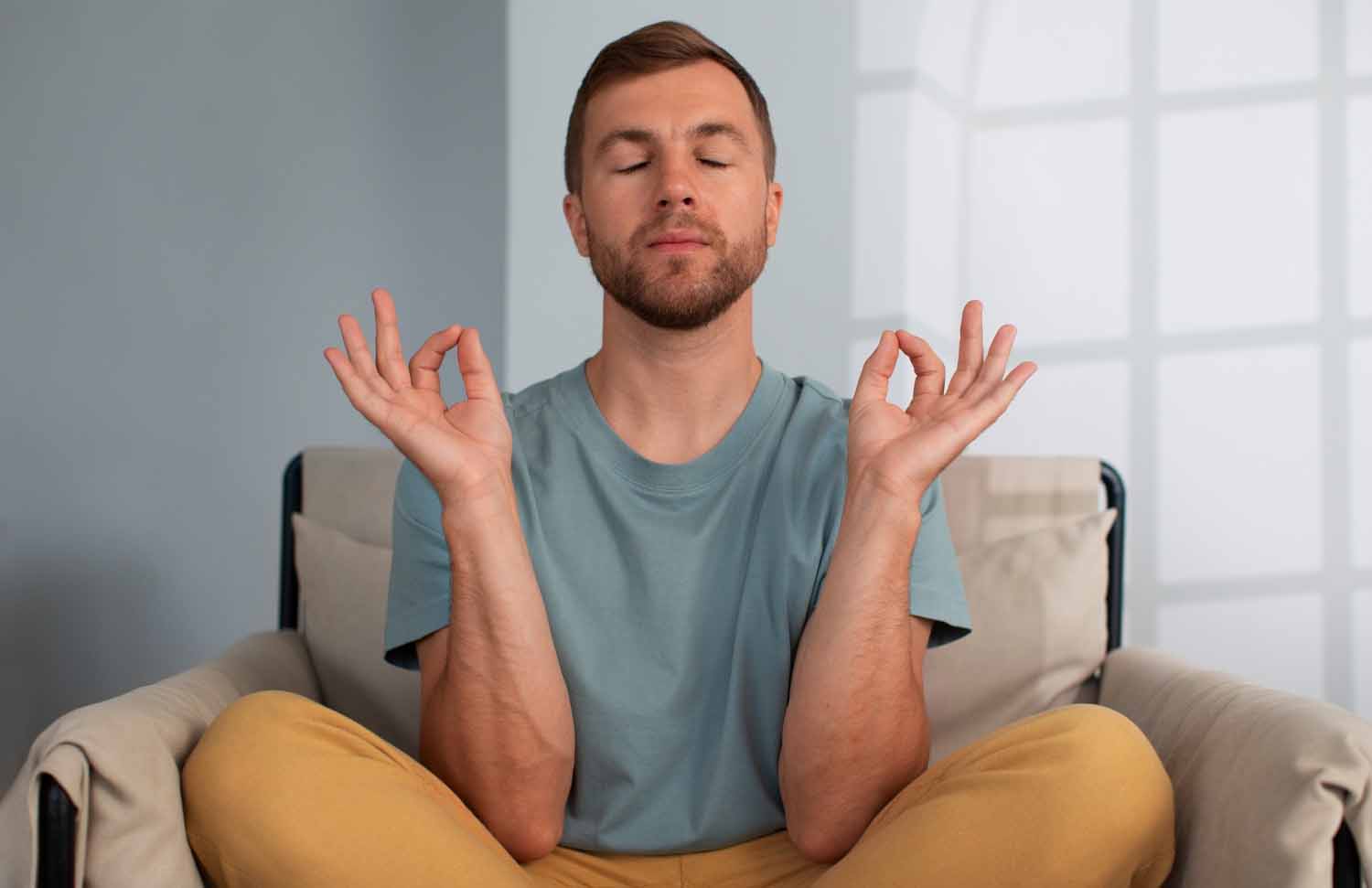In today’s busy world, getting a good night’s sleep can be tough. Stress, worries, and constant distractions can make it hard to relax and rest. But there’s a simple and powerful tool that can help you sleep better: meditation. As we move into 2024, adding meditation to your bedtime routine might be the secret to better sleep and improved overall health.
In this blog, we’ll share easy techniques of meditation for sleep designed to help you sleep deeply. Whether you’re new to meditation or have been doing it for years, these tips will guide you to use mindfulness to calm your mind and achieve restful sleep.
From guided meditation for sleep to simple breathing exercises, you’ll learn how to create a peaceful bedtime habit that will leave you feeling refreshed and energized every morning. Say goodbye to restless nights and hello to peaceful, deep sleep.
How can Meditation help with Sleep?
Meditation can be a powerful tool to improve sleep quality and address various sleep-related issues. By incorporating meditation into your nightly routine, you can significantly reduce stress and anxiety, which are common culprits behind sleepless nights. When you meditate, your body’s cortisol levels (the stress hormone) decrease, promoting a sense of calm and relaxation. This mental peace can help ease the transition from wakefulness to sleep, making it easier to drift off.
Improving emotional health through regular meditation practice can also lead to fewer sleep disturbances. Better mood and reduced symptoms of depression and anxiety contribute to better sleep. Certain meditation techniques, such as guided imagery or scan body meditations, promote deeper stages of sleep by encouraging profound relaxation of the body and mind. This deep relaxation is crucial for restorative sleep, ensuring you wake up refreshed and ready for the day.
Incorporating meditation into your daily routine can create a more conducive environment for restful and restorative sleep. Consistency and practice are key to experiencing these benefits over time. By committing to a regular meditation practice, you can transform your sleep patterns and enjoy the numerous benefits of a good night’s sleep.
Benefits of Meditation for Sleep

1. Improved Sleep Quality
Sleep meditation not only helps you fall asleep faster and stay asleep longer but also promotes deeper and more restorative sleep. The techniques involved, such as focused breathing or progressive muscle relaxation, actively calm the mind and body. This deep relaxation allows your nervous system to shift into a parasympathetic state, often referred to as the “rest and digest” mode, which is conducive to high-quality sleep. As a result, you wake up feeling more refreshed and energized, ready to tackle the day ahead.
2. Reduced Stress and Anxiety
One of the primary benefits of sleep meditation is its ability to reduce stress and anxiety levels. When you meditate, you engage in practices that encourage relaxation and mindfulness, both of which help counteract the physiological and psychological effects of stress. By regularly practicing meditation before bed, you can create a calming bedtime ritual that signals to your body and mind that it’s time to unwind and prepare for sleep.
3. Enhanced Emotional Health
Sleep meditation plays a crucial role in enhancing emotional health by fostering a sense of inner peace and stability. By cultivating mindfulness and awareness during meditation sessions, you develop skills to observe and accept your thoughts and emotions without judgment. This emotional resilience translates into improved mood regulation and reduced symptoms of depression and anxiety.
4. Better Sleep Patterns
Consistent practice of sleep meditation helps establish healthy sleep patterns by reinforcing a bedtime routine. When you commit to meditation before sleep, you signal to your body that it’s time to wind down, creating a consistent sleep-wake cycle. This routine strengthens the association between relaxation and sleep, making it easier to transition into restful slumber each night.
5. Increased Melatonin Production
Meditation has been linked to increased production of melatonin, a hormone critical for regulating sleep-wake cycles. By practicing meditation regularly, especially techniques focused on relaxation and mindfulness, you can naturally enhance melatonin levels in the body. This hormonal balance not only supports better sleep quality but also helps synchronize your internal biological clock, making it easier to fall asleep at night and wake up feeling refreshed in the morning.
6. Reduced Insomnia Symptoms
For individuals struggling with insomnia, sleep meditation offers a holistic approach to reducing symptoms and improving sleep duration and quality. Meditation techniques like guided imagery or body scan meditation can help quiet racing thoughts and alleviate the physical tension that often accompanies insomnia. By promoting relaxation and reducing hyperarousal.
7. Enhanced Relaxation
Sleep meditation promotes deep relaxation of both the mind and body, helping to release tension accumulated throughout the day. Techniques such as progressive muscle relaxation systematically relax each muscle group, while mindfulness practices encourage letting go of mental tension and stress. This comprehensive relaxation response not only prepares you for sleep but also enhances overall physical and mental well-being.
8. Improved Mindfulness and Awareness
Mindfulness meditation practiced during sleep preparation enhances your awareness of the present moment, allowing you to fully experience and appreciate the transition from wakefulness to sleep. By focusing on sensations like the breath or bodily sensations, you develop a heightened sensitivity to internal signals that indicate readiness for sleep. This increased mindfulness can reduce mind wandering and promote a state of relaxed alertness, optimizing conditions for falling asleep naturally and effortlessly.
9. Reduced Physical Discomfort
Meditation techniques used in sleep preparation can help alleviate physical discomfort that might interfere with sleep. By directing attention to areas of tension and using relaxation methods such as visualization or breath awareness, you can soothe bodily discomfort and promote relaxation. This targeted approach not only supports better sleep but also enhances overall physical comfort and well-being, fostering a deeper connection between mind and body.
10. Enhanced Cognitive Function
Quality sleep facilitated by meditation is essential for cognitive function, memory consolidation, and optimal brain health. During sleep, the brain processes and integrates information obtained throughout the day, supporting learning and memory retention. By improving sleep quality and duration, meditation contributes to enhanced cognitive abilities, including better focus, attention, and decision-making skills.
11. Lower Blood Pressure
Regular meditation practice has been associated with lower blood pressure levels, which contributes to better cardiovascular health and reduces the risk of sleep disruptions caused by hypertension. By promoting relaxation and reducing stress, meditation supports a healthy heart and vascular system, creating favorable conditions for restful sleep. Lower blood pressure levels achieved through meditation also contribute to overall well-being and longevity.
12. Greater Sense of Well-being
Ultimately, sleep meditation contributes to a greater sense of overall well-being by promoting restful and rejuvenating sleep. By integrating meditation into your bedtime routine, you can enjoy the cumulative benefits of improved sleep quality, reduced stress, enhanced emotional resilience, and better physical health. This holistic approach to sleep hygiene supports optimal functioning across all aspects of life, fostering a sense of vitality, balance, and contentment.
How to Practice Sleep Meditation
Practicing sleep meditation involves creating a calming bedtime routine that helps prepare your mind and body for restful sleep. Here’s a step-by-step guide on how to practice sleep meditation effectively:
1. Choose a Comfortable Position:
Find a comfortable position in bed, either lying down on your back or in a position that feels natural and relaxing to you. Use pillows and blankets as needed to support your body and ensure comfort.
2. Create a relaxing environment:
Dim the lights and eliminate distractions in your bedroom. Consider using calming scents like lavender or playing soft, soothing music in the background to create a peaceful atmosphere.
3. Practice relaxation techniques:
Start with deep breathing exercises to calm your mind and body. Inhale deeply through your nose, hold for a moment, and exhale slowly through your mouth. Repeat this process several times to relax tension and promote relaxation.
4. Body Scan Meditation:
Conduct a body scan by mentally focusing on each part of your body, starting from your toes and moving upward to your head. As you focus on each body part, consciously release any tension you may feel. This technique helps promote physical relaxation.
5. Visualize calmness:
Use guided imagery or visualization to imagine yourself in a peaceful and serene environment. Picture a tranquil scene such as a beach or a forest, and immerse yourself in the sights, sounds, and sensations of this calming place.
6. Mindfulness Meditation:
Practice mindfulness by gently bringing your awareness to the present moment. Observe any thoughts or sensations that arise without judgment, and then gently redirect your focus back to your breath or a soothing mantra.
7. Progressive Muscle Relaxation (PMR):
Tense and relax each muscle group in your body, starting from your feet and moving upward to your face. Consciously tense each muscle group for a few seconds, then release the tension completely. This technique helps release physical tension and prepare your body for sleep.
8. Use relaxing affirmations:
Repeat positive affirmations or soothing phrases silently to yourself, such as “I am calm and peaceful” or “My body is relaxed, and my mind is at ease.” Affirmations can help shift your mindset into a state conducive to sleep.
9. Focus on Breath Awareness:
Concentrate on your breath as it naturally rises and falls. Notice the sensations of each inhale and exhale, focusing your attention on the physical sensations of breathing. This practice helps anchor your mind and reduce racing thoughts.
10. Avoid stimulating activities:
Refrain from engaging in stimulating activities or using electronic devices (e.g., smartphones, tablets) at least 30 minutes before bedtime. These activities can interfere with relaxation and hinder your ability to fall asleep.
Final Thoughts:
Using meditation for sleep can really help you get better sleep in 2024. By calming your mind and relaxing your body, you can fall asleep faster and sleep more deeply. Whether you’re new to meditation or have done it before, the tips in this guide can help you create a bedtime routine that works for you. Just remember, it takes time and practice, so be patient with yourself. Stick with it, and soon you’ll be enjoying peaceful, restful nights and waking up feeling refreshed. Sleep well!



Achieving Deep Sleep Through Meditation: Tips for 2024